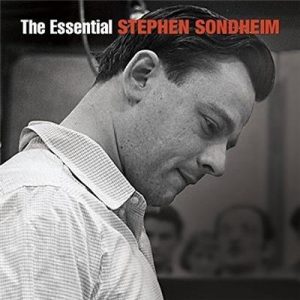
 The latest Stephen Sondheim compilation album immediately courts scrutiny when it announces itself as The Essential Stephen Sondheim. For, as even the most cursory of musical theatre fans know, and as the digital booklet which accompanies the two disk affair explains, Sondheim changed the course of American musical theatre. And he didn’t just do it with a handful of songs. From his first work as lyricist on Gypsy to his first work as lyricist and composer on Forum to his last Tony win with Passion, and even beyond, Stephen Sondheim's gargantuan oeuvre is marked by excellent musical theatre songs. How does one even begin to whittle down the most essential? And essential to whom? And which iteration is the most essential? So many questions and so much to acquit itself of.
The latest Stephen Sondheim compilation album immediately courts scrutiny when it announces itself as The Essential Stephen Sondheim. For, as even the most cursory of musical theatre fans know, and as the digital booklet which accompanies the two disk affair explains, Sondheim changed the course of American musical theatre. And he didn’t just do it with a handful of songs. From his first work as lyricist on Gypsy to his first work as lyricist and composer on Forum to his last Tony win with Passion, and even beyond, Stephen Sondheim's gargantuan oeuvre is marked by excellent musical theatre songs. How does one even begin to whittle down the most essential? And essential to whom? And which iteration is the most essential? So many questions and so much to acquit itself of.
Compilations for someone as prolific as Sondheim will always be a difficult enterprise because there are so many options to choose from. The "essential" which the title alludes to, indicates at least one key number from the majority of Steve's complete scores as lyricist and/or composer (missing are entries from Saturday Night, The Road Show and The Frogs). For the Sondheim enthusiast it is a compilation of familiar material, with no cut songs or no surprising rendition of a number. This Essential Sondheim serves as a "bread-and-butter of Sondheim" kind of recording.
So, of course, revelatory, aspect of the album is the choices for which renditions are chosen. The producers unsurprisingly privilege the Original Broadway Cast recording. Sondheim has been on record as preferring the original renditions of songs in most cases, since they tend to be the people who the songs grew into themselves with. Twenty of the thirty tracks chosen utilise their original recording, making the one-third songs where the original isn’t used that much interesting and in some cases perplexing. The choice to use the film versions of West Side Story are unsurprising, and the concert recordings for Follies are understandable if mildly disappointing (Barbara Cook, for example, has sung “Losing My Mind” more lustily elsewhere and I’d have preferred Elaine’s Stritch’s “I’m Still Here” to Carol Burnett’s). Even if the choices are never my favourite there's little to be mad about for the choices in most cases here, but for two. The two most unfortunate unfortunate moments on this Essential compilations are the decisions to not use the original renditions of the numbers from Passion and Dick Tracy. The latter hardly surprises, it’s a musical theatre album and Karen Ziemba has musical pedigree Madonna does not, and yet even if “serious” theatre fans will disdain Madonna’s chops, Sondheim works so effectively on writing for Madonna on the Dick Tracy numbers her vocal flair on “Sooner Or Later” has never been topped even by “superior” singers (Bernadette Peters did match her wryness in her Sondheim, etc, at Carnegie Hall album). The jazz recording of the heartrending “Loving You” from Passion, though always well sung by Peabo Bryson and Nancy Wilson (from his Color and Light - Jazz Sketches on Stephen Sondheim) is a shame, too. "Loving You" in context is such a painful, emotive number the light (if beautifully sung) jazz rendition has always failed to show the cutting power of the number, and as the closing number of the two disc affair, something more powerful would have been appreciated - ending with "I Wish I Could Forget You" (not included), perhaps?
The album traces Sondheim from West Side Story to Passion in chronological order, a nice touch in some respects. Although, production wise, one does wonder whether the entire album would not have benefited from something else. This chronological grouping means the numbers all appear with their respective shows – all the West Side Story numbers together, all the Gypsy numbers, making the compilation a lot less spontaneous in appearance than the best compilations.
The thing is, though, when confronted with the age old questions of how many Sondheim compilations one really needs, it’s hard not to feel like the answer is one more than you already have. Does one need this new compilation – considering that you’re likely to have all the original albums which the songs belong to I’m not certain, but the series acquits itself of its most essential task. Were a new person looking for an entry point to Sondheim curious for an album, they could not go wrong with this collection. Is it Sondheim’s best? Too many to choose from. But it’s an excellent collection of well sung numbers from throughout his career. It’s more than good enough.